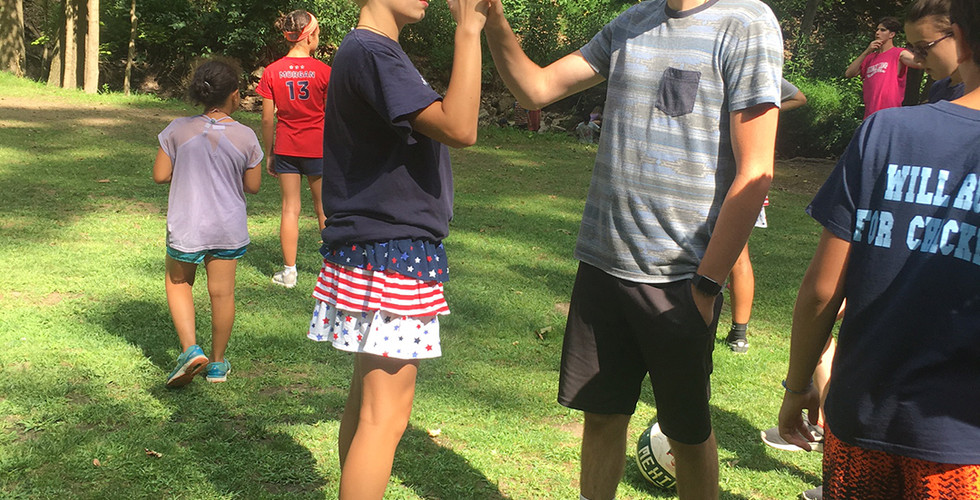Learning a second language and increasing one’s cultural awareness can provide a multitude of benefits.
Helena Schaefers has experienced these advantages firsthand during her 36-year stint as teacher and then director of Language Camp at Sharpsburg’s Camp Guyasuta. The most important aspects of learning another language, she said, are gaining tolerance for people from different backgrounds and connecting with others in another language.
She recalled educating her acquaintances after they laughed at a man wearing Lederhosen (traditional leather shorts worn in German-speaking countries) at an American train station. Schaefers explained to them the clothing’s significance.
In another instance, she used her language skills to help a woman, who was lost, find her bus. “She was pretty frantic and she was speaking German, and I was able to go and help her,” she said. “It was such a rewarding experience.”
Annemarie Frick’s noncredit French and German courses, offered through Community College of Allegheny County’s (CCAC) Community Education division, have allowed her students to garner a greater understanding of their ethnic roots.
“They heard their parents speaking German, but never completely learned it because at that time, years after the Second World War, people wanted to adjust here and spoke English with their kids,” she explained. “Now that the students are older, they’re seeing what they’re missing.”
Schaefers noted that learning a second language may help students improve memory and critical thinking skills. “Research has shown that children who take another language have increased their skills in other subjects. You’re able to feed the brain,” she said.
Similarly, Frick said that it has led to improved grammar and fluency in some of her students’ native tongues.
Schaefers credits her bilingualism for her rewarding 25-year career with Pittsburgh Public Schools teaching first-graders German. Now, her job entails planning the week-long Language Camp for first- through ninth-graders learning German, French or Spanish.
Frick said that Americans traveling to Europe sometimes assume that the locals will speak English. “Sometimes that is true in big cities, but as soon as you go out in the country, it may not be true anymore,” she said. “Plus, people love it when you make an effort and you say a few things in their language.”
Frick is a native of Switzerland, where French, German, Italian and Romansh are the official languages.
While the ability to achieve total fluency becomes nearly impossible after the age of 10, according to a 2018 study published in Cognition: International Journal of Cognitive Science, as reported by Time Magazine, the critical period for language learning is far longer than previously thought. People may still excel at picking up second languages beyond adolescence, though they won’t reach native-level fluency.
The article noted that possible explanations could include changes in brain plasticity, lifestyle changes related to entering the workforce or college, or an unwillingness to learn new things, which increases with age.
“I know children ages 4, 5 and 6 who already speak three languages; it’s really amazing,” said Frick, who tutors people of all ages. “To learn something when you’re older is good for your brain; I call it gymnastics for the brain.”
At CCAC, Frick leads eight-week intensive courses covering travel basics such as dining and transportation in French- and German-speaking countries, in addition to her beginner, intermediate and advanced language courses. She reads to students in the languages that they’re studying, teaches them grammar and encourages them to read media in those languages.
Meanwhile, Schaefers’ campers participate in traditional activities scheduled around language learning sessions. They may speak German, Spanish or French and use provided Euros to purchase items at an on-site store.
“It's just like being in a foreign country; we try to simulate that, where you're hearing a foreign language spoken all day long,” Schaefers said. “Because it’s camp, you know, the children don't even know that they're learning.”
Following dinner each night, campers participate in a sing-along. They learn about cultural traditions around the world by attending Oktoberfest, Carnival and Quinceañera celebrations.
“Our main thing is that we want it to be a fun learning experience, and we really do succeed in that,” said Schaefers.
Another option is Duolingo, the most popular language-learning platform and downloaded education app worldwide. The Pittsburgh-based company offers 97 courses across nearly 40 distinct languages and is available for iOS, Android, and online at www.duolingo.com.
According to their website, free, short lessons are designed to “feel more like a game than a textbook” and focus on commonly used phrases along with “quirky sentences” that learners will remember. Machine learning algorithms customize material for appropriate user-difficulty levels.
Duolingo usage has soared during the pandemic. “Learning a new language isn't just a fun, productive habit to pass the time; for our learners, language is a bridge between people enduring the same uncertainty all around the world,” said Cindy Blanco on the Duolingo blog.
Regardless of how one learns a second language, Schaefers and Frick agree that it’s important to continue utilizing one’s skills so as not to forget it. The instructors suggest reading and watching media in the foreign language, using instructional apps and taking refresher courses.
For more information about Language Camp, contact helenaschaefers@hotmail.com. To learn about CCAC’s Community Education programs, visit www.ccac.edu/workforce/workforce-community-ed.


















































Comentarios